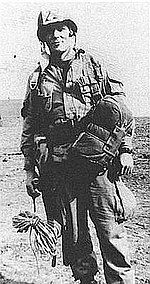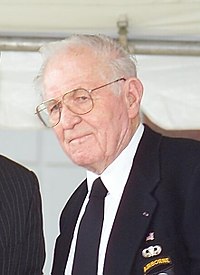- Posts: 4760
- Thank you received: 0
NEED to KNOW!!!! These Heroes!!!
- TPP
-
 Topic Author
Topic Author
- User is blocked
-

Less
More
07 Nov 2011 07:09 #131
by TPP
Replied by TPP on topic NEED to KNOW!!!! These Heroes!!!
[center:2o0l96nx]Clayton K. Slack
[/center:2o0l96nx]
[center:2o0l96nx] [/center:2o0l96nx]
[center:2o0l96nx] [/center:2o0l96nx]
SLACK, CLAYTON K.
Rank and Organization: Private, U.S. Army, Company D, 124th Machine Gun Battalion, 33d Division. Place and Date: Near Consenvoye, France, 8 October 1918. Entered Service At: Madison, Wis. Born: 23 February 1896, Plover, Wis. G. O. No.: 16, W.D., 1919.
Citation:
Observing German soldiers under cover 50 yards away on the left flank, Pvt. Slack, upon his own initiative, rushed them with his rifle and, single-handed, captured 10 prisoners and 2 heavy-type machineguns, thus saving his company and neighboring organizations from heavy casualties.
http://homeofheroes.com/moh/citations_1918_wwi/slack.html
Read more at: http://en.wikipedia.org/wiki/Clayton_K._Slack
[center:2o0l96nx] [/center:2o0l96nx]
[center:2o0l96nx] [/center:2o0l96nx]
SLACK, CLAYTON K.
Rank and Organization: Private, U.S. Army, Company D, 124th Machine Gun Battalion, 33d Division. Place and Date: Near Consenvoye, France, 8 October 1918. Entered Service At: Madison, Wis. Born: 23 February 1896, Plover, Wis. G. O. No.: 16, W.D., 1919.
Citation:
Observing German soldiers under cover 50 yards away on the left flank, Pvt. Slack, upon his own initiative, rushed them with his rifle and, single-handed, captured 10 prisoners and 2 heavy-type machineguns, thus saving his company and neighboring organizations from heavy casualties.
http://homeofheroes.com/moh/citations_1918_wwi/slack.html
Read more at: http://en.wikipedia.org/wiki/Clayton_K._Slack
Please Log in or Create an account to join the conversation.
- TPP
-
 Topic Author
Topic Author
- User is blocked
-

Less
More
- Posts: 4760
- Thank you received: 0
08 Nov 2011 05:28 #132
by TPP
Replied by TPP on topic NEED to KNOW!!!! These Heroes!!!
[center:1k6fcqbt]
[/center:1k6fcqbt]
[center:1k6fcqbt]Chester Howard West [/center:1k6fcqbt]
[center:1k6fcqbt] [/center:1k6fcqbt]
Rank and Organization: First Sergeant, U.S. Army, Company D, 363d Infantry, 91st Division. Place and Date: Near Bois-de-Cheppy, France, 26 September 1918. Entered Service At: Los Banos, Calif. Birth: Fort Collins, Colo. G. O. No.: 34, W.D., 1919.
Citation: While making his way through a thick fog with his automatic rifle section, his advance was halted by direct and unusual machinegun fire from 2 guns. Without aid, he at once dashed through the fire and, attacking the nest, killed 2 of the gunners, 1 of whom was an officer. This prompt and decisive hand-to-hand encounter on his part enabled his company to advance farther without the loss of a man.
http://homeofheroes.com/moh/citations_1918_wwi/west.html
http://www.findagrave.com/cgi-bin/fg.cgi?page=gr&GRid=7190335
[center:1k6fcqbt]Chester Howard West [/center:1k6fcqbt]
[center:1k6fcqbt] [/center:1k6fcqbt]
Rank and Organization: First Sergeant, U.S. Army, Company D, 363d Infantry, 91st Division. Place and Date: Near Bois-de-Cheppy, France, 26 September 1918. Entered Service At: Los Banos, Calif. Birth: Fort Collins, Colo. G. O. No.: 34, W.D., 1919.
Citation: While making his way through a thick fog with his automatic rifle section, his advance was halted by direct and unusual machinegun fire from 2 guns. Without aid, he at once dashed through the fire and, attacking the nest, killed 2 of the gunners, 1 of whom was an officer. This prompt and decisive hand-to-hand encounter on his part enabled his company to advance farther without the loss of a man.
http://homeofheroes.com/moh/citations_1918_wwi/west.html
http://www.findagrave.com/cgi-bin/fg.cgi?page=gr&GRid=7190335
Please Log in or Create an account to join the conversation.
- TPP
-
 Topic Author
Topic Author
- User is blocked
-

Less
More
- Posts: 4760
- Thank you received: 0
08 Nov 2011 08:33 #133
by TPP
Replied by TPP on topic NEED to KNOW!!!! These Heroes!!!
[center:2b376pjz]https://snt126.mail.live.com/att/GetAttachment.aspx?tnail=0&messageId=724b6dfc-0a1e-11e1-bb05-002264c15466&Aux=14|0|8CE6C42571C4350||0|0|0|0||&maxwidth=880&maxheight=640&size=Att[/center:2b376pjz]
Please Log in or Create an account to join the conversation.
- TPP
-
 Topic Author
Topic Author
- User is blocked
-

Less
More
- Posts: 4760
- Thank you received: 0
09 Nov 2011 06:08 #134
by TPP
Replied by TPP on topic NEED to KNOW!!!! These Heroes!!!
[center:2k7j2y9h]Daniel DeWayne Merriweather
[/center:2k7j2y9h]
[center:2k7j2y9h] [/center:2k7j2y9h][center:2k7j2y9h]Collierville, Tennessee
January 13, 2010
Age - 25 Military - Army Rank - SSG Unit/Location - 118th Military Police Company (Airborne), 503rd Military Police Battalion (Airborne), 16th Military Police Brigade (Airborne)
Fort Bragg, North Carolina[/center:2k7j2y9h]
Died at Combat Outpost McClain, Afghanistan, of wounds suffered when enemy forces attacked their vehicle with an improvised explosive device.
From Ashley 03/21/10:
His name is SSG Daniel DeWayne Merriweather. He was stationed at FT Bragg, NC. He was born May 27, 1984 and was KIA Jan 13, 2010.
His wifes name is Rachelle, he has a 3 year old son named Kale- , and a 4 month old son named Daniel DeWayne Merriweather II- with his mother, Rachelle. His moms name is Pam and his sibilings names are Darryl , Adrienne and William. He is from Southhaven, MS.
Read the rest at http://www.iraqwarheroes.org/merriweather.htm
More at: http://militarytimes.com/valor/army-staff-sgt-daniel-d-merriweather/4459023
[center:2k7j2y9h] [/center:2k7j2y9h][center:2k7j2y9h]Collierville, Tennessee
January 13, 2010
Age - 25 Military - Army Rank - SSG Unit/Location - 118th Military Police Company (Airborne), 503rd Military Police Battalion (Airborne), 16th Military Police Brigade (Airborne)
Fort Bragg, North Carolina[/center:2k7j2y9h]
Died at Combat Outpost McClain, Afghanistan, of wounds suffered when enemy forces attacked their vehicle with an improvised explosive device.
From Ashley 03/21/10:
His name is SSG Daniel DeWayne Merriweather. He was stationed at FT Bragg, NC. He was born May 27, 1984 and was KIA Jan 13, 2010.
His wifes name is Rachelle, he has a 3 year old son named Kale- , and a 4 month old son named Daniel DeWayne Merriweather II- with his mother, Rachelle. His moms name is Pam and his sibilings names are Darryl , Adrienne and William. He is from Southhaven, MS.
Read the rest at http://www.iraqwarheroes.org/merriweather.htm
More at: http://militarytimes.com/valor/army-staff-sgt-daniel-d-merriweather/4459023
Please Log in or Create an account to join the conversation.
- TPP
-
 Topic Author
Topic Author
- User is blocked
-

Less
More
- Posts: 4760
- Thank you received: 0
10 Nov 2011 04:38 - 10 Nov 2011 06:24 #135
by TPP
Replied by TPP on topic NEED to KNOW!!!! These Heroes!!!
[center:2vvkb4ey]To Past, Present, & Future, Marines!!!
[/b][/size][/center:2vvkb4ey]
[center:2vvkb4ey] [/center:2vvkb4ey]
[center:2vvkb4ey] [/center:2vvkb4ey][center:2vvkb4ey]HAPPY BIRTHDAY!!! [/center:2vvkb4ey]
[center:2vvkb4ey] [/center:2vvkb4ey]
[center:2vvkb4ey] [/center:2vvkb4ey]
[center:2vvkb4ey] [/center:2vvkb4ey]
[center:2vvkb4ey] [/center:2vvkb4ey]
[center:2vvkb4ey] [/center:2vvkb4ey]
[center:2vvkb4ey] [/center:2vvkb4ey]
THANK YOU!
[center:2vvkb4ey] [/center:2vvkb4ey]
[center:2vvkb4ey] [/center:2vvkb4ey][center:2vvkb4ey]HAPPY BIRTHDAY!!! [/center:2vvkb4ey]
[center:2vvkb4ey] [/center:2vvkb4ey]
[center:2vvkb4ey] [/center:2vvkb4ey]
[center:2vvkb4ey] [/center:2vvkb4ey]
[center:2vvkb4ey] [/center:2vvkb4ey]
[center:2vvkb4ey] [/center:2vvkb4ey]
[center:2vvkb4ey] [/center:2vvkb4ey]
THANK YOU!
Last edit: 10 Nov 2011 06:24 by TPP.
Please Log in or Create an account to join the conversation.
- TPP
-
 Topic Author
Topic Author
- User is blocked
-

Less
More
- Posts: 4760
- Thank you received: 0
10 Nov 2011 06:19 #136
by TPP
Replied by TPP on topic NEED to KNOW!!!! These Heroes!!!
Please Log in or Create an account to join the conversation.
- TPP
-
 Topic Author
Topic Author
- User is blocked
-

Less
More
- Posts: 4760
- Thank you received: 0
11 Nov 2011 04:59 #137
by TPP
Replied by TPP on topic NEED to KNOW!!!! These Heroes!!!
[center:ua1qx5xl]To all that have NEVER forgotten that Freedom is NOT FREE!
Happy Veterans Day and THANK YOU all. [/center:ua1qx5xl]
Happy Veterans Day and THANK YOU all. [/center:ua1qx5xl]
Please Log in or Create an account to join the conversation.
- TPP
-
 Topic Author
Topic Author
- User is blocked
-

Less
More
- Posts: 4760
- Thank you received: 0
14 Nov 2011 06:15 #138
by TPP
Replied by TPP on topic NEED to KNOW!!!! These Heroes!!!
[center:2gopfmy1]Richard "Dick" D. Winters
[/center:2gopfmy1]
[center:2gopfmy1] Dick Winters in 2004[/center:2gopfmy1]
[center:2gopfmy1] [/center:2gopfmy1]
Remembering a Soldier’s Soldier
The stellar example of Maj. Dick Winters
Lee Habeeb
November 11, 2011 12:00 A.M.
Every American should know his name and his story. And, thanks to a great book by Stephen Ambrose — Band of Brothers — and an equally great HBO television series, many do. What millions of Americans don’t know is that Richard “Dick” Winters died on January 2 at the age of 92.
“Son, that is what you call a soldier’s soldier,” my dad, an Air Force man, told me after the epic series ended. And you know how charitable Air Force men are about Army men.
The Washington Post didn’t report his death until January 9, and relegated the story to the obituary pages, rather than featuring a lengthy celebration on page one — which is what Winters’s life demanded. Indeed, we heard very little from the media about this great man’s death, largely because so few in the media actually cared about his life.
If Cher had died, we’d have heard endless stories within hours, with Diane Sawyer, Matt Lauer, Katie Couric, and Piers Morgan all fighting desperately to get the exclusive with Chaz.
Our media is bad, but our schools are worse. Our kids are peddled Earth Day celebrations, and cancer-awareness, drug-awareness, even clean-colon-awareness days. They get sex instruction, diversity seminars, and global-warming tutorials from Al Gore, but Veterans Day, and the stories of men like Maj. Dick Winters — well, that’s just not stuff with which we should be pestering our kids.
Major Winters, a longtime resident of Hershey, Pa., died at an assisted-living facility in nearby Campbelltown. But it is his life that we should all know, and the lives of the men he fought with.
Band of Brothers chronicled the men of E Company, 2nd Battalion, 506th Parachute Infantry Regiment, 101st Airborne Division. The group came to be known as “Easy Company,” but there was nothing easy about their tour of duty. That brave band of warriors jumped into combat in June 1944, starting near the beaches of France. They fought their way through Operation Market Garden in the Netherlands and the Battle of the Bulge, all the way to Hitler’s retreat — the Eagle’s Nest — tucked in the Alps above Berchtesgaden.
It was some of the toughest fighting in the European Theater. As a result of high battlefield casualties, the unit experienced heavy turnover. One Easy Company soldier later wrote that among his colleagues, the Purple Heart “was not a decoration but a badge of office.”
One of Easy Company’s very best officers was Maj. Dick Winters. He was the kind of guy anyone would wish to call their boss. Late in the war, one of his soldiers, Floyd Talbert, wrote him a letter from an Indiana hospital, thanking him for his loyalty and leadership. “You are loved and will never be forgotten by any soldier that ever served under you,” Talbert wrote. “I would follow you into hell.”
http://www.nationalreview.com/articles/282922/remembering-soldier-s-soldier-lee-habeeb
and at http://en.wikipedia.org/wiki/Richard_Winters
[center:2gopfmy1] Dick Winters in 2004[/center:2gopfmy1]
[center:2gopfmy1] [/center:2gopfmy1]
Remembering a Soldier’s Soldier
The stellar example of Maj. Dick Winters
Lee Habeeb
November 11, 2011 12:00 A.M.
Every American should know his name and his story. And, thanks to a great book by Stephen Ambrose — Band of Brothers — and an equally great HBO television series, many do. What millions of Americans don’t know is that Richard “Dick” Winters died on January 2 at the age of 92.
“Son, that is what you call a soldier’s soldier,” my dad, an Air Force man, told me after the epic series ended. And you know how charitable Air Force men are about Army men.
The Washington Post didn’t report his death until January 9, and relegated the story to the obituary pages, rather than featuring a lengthy celebration on page one — which is what Winters’s life demanded. Indeed, we heard very little from the media about this great man’s death, largely because so few in the media actually cared about his life.
If Cher had died, we’d have heard endless stories within hours, with Diane Sawyer, Matt Lauer, Katie Couric, and Piers Morgan all fighting desperately to get the exclusive with Chaz.
Our media is bad, but our schools are worse. Our kids are peddled Earth Day celebrations, and cancer-awareness, drug-awareness, even clean-colon-awareness days. They get sex instruction, diversity seminars, and global-warming tutorials from Al Gore, but Veterans Day, and the stories of men like Maj. Dick Winters — well, that’s just not stuff with which we should be pestering our kids.
Major Winters, a longtime resident of Hershey, Pa., died at an assisted-living facility in nearby Campbelltown. But it is his life that we should all know, and the lives of the men he fought with.
Band of Brothers chronicled the men of E Company, 2nd Battalion, 506th Parachute Infantry Regiment, 101st Airborne Division. The group came to be known as “Easy Company,” but there was nothing easy about their tour of duty. That brave band of warriors jumped into combat in June 1944, starting near the beaches of France. They fought their way through Operation Market Garden in the Netherlands and the Battle of the Bulge, all the way to Hitler’s retreat — the Eagle’s Nest — tucked in the Alps above Berchtesgaden.
It was some of the toughest fighting in the European Theater. As a result of high battlefield casualties, the unit experienced heavy turnover. One Easy Company soldier later wrote that among his colleagues, the Purple Heart “was not a decoration but a badge of office.”
One of Easy Company’s very best officers was Maj. Dick Winters. He was the kind of guy anyone would wish to call their boss. Late in the war, one of his soldiers, Floyd Talbert, wrote him a letter from an Indiana hospital, thanking him for his loyalty and leadership. “You are loved and will never be forgotten by any soldier that ever served under you,” Talbert wrote. “I would follow you into hell.”
http://www.nationalreview.com/articles/282922/remembering-soldier-s-soldier-lee-habeeb
and at http://en.wikipedia.org/wiki/Richard_Winters
Please Log in or Create an account to join the conversation.
- TPP
-
 Topic Author
Topic Author
- User is blocked
-

Less
More
- Posts: 4760
- Thank you received: 0
15 Nov 2011 06:07 #139
by TPP
Replied by TPP on topic NEED to KNOW!!!! These Heroes!!!
[center:1p5rr1b0]Col Leo K. Thorsness, USAF
[/center:1p5rr1b0]
[center:1p5rr1b0] [/center:1p5rr1b0]
[center:1p5rr1b0]Born February 14, 1932 (age 79)
Walnut Grove, Minnesota
Allegiance United States of America
Service/branch United States Air Force
Years of service 1951-1973
Rank Colonel
Unit 357th Tactical Fighter Squadron, 355th Tactical Fighter Wing
Battles/wars Vietnam War
Awards Medal of Honor
Silver Star (2)
Distinguished Flying Cross (6)
Purple Heart (2)
Air Medal (16)[/center:1p5rr1b0]
Other work
Litton Industries
Washington State Senator
Litton
Leo Keith Thorsness (born February 14, 1932) is a retired colonel in the United States Air Force who received the Medal of Honor for his actions in the Vietnam War. He was awarded the medal for an air engagement on April 19, 1967. He was shot down two weeks later and spent six years in captivity in North Vietnam as a prisoner of war. After his military service, Thorsness served one term in the Washington State Senate.
Read http://en.wikipedia.org/wiki/Leo_K._Thorsness
[center:1p5rr1b0] [/center:1p5rr1b0]
[center:1p5rr1b0]Born February 14, 1932 (age 79)
Walnut Grove, Minnesota
Allegiance United States of America
Service/branch United States Air Force
Years of service 1951-1973
Rank Colonel
Unit 357th Tactical Fighter Squadron, 355th Tactical Fighter Wing
Battles/wars Vietnam War
Awards Medal of Honor
Silver Star (2)
Distinguished Flying Cross (6)
Purple Heart (2)
Air Medal (16)[/center:1p5rr1b0]
Other work
Litton Industries
Washington State Senator
Litton
Leo Keith Thorsness (born February 14, 1932) is a retired colonel in the United States Air Force who received the Medal of Honor for his actions in the Vietnam War. He was awarded the medal for an air engagement on April 19, 1967. He was shot down two weeks later and spent six years in captivity in North Vietnam as a prisoner of war. After his military service, Thorsness served one term in the Washington State Senate.
Read http://en.wikipedia.org/wiki/Leo_K._Thorsness
Please Log in or Create an account to join the conversation.
- TPP
-
 Topic Author
Topic Author
- User is blocked
-

Less
More
- Posts: 4760
- Thank you received: 0
16 Nov 2011 06:30 #140
by TPP
Replied by TPP on topic NEED to KNOW!!!! These Heroes!!!
[center:22ntpm2c]Jackie L Larsen
[/center:22ntpm2c]
[center:22ntpm2c] [/center:22ntpm2c]
[center:22ntpm2c]Subie Bay Navy Base, Phillipines
July 17, 2008
Age -37 Military - Air Force Rank - TSgt Unit/Location - 9th Reconnaissance Wing
Beale Air Force Base, California
Died of natural causes July 17 at Balad Air Base, Iraq.[/center:22ntpm2c]
Read the rest at : http://www.iraqwarheroes.org/larsenjl.htm
[center:22ntpm2c] [/center:22ntpm2c]
[center:22ntpm2c]Subie Bay Navy Base, Phillipines
July 17, 2008
Age -37 Military - Air Force Rank - TSgt Unit/Location - 9th Reconnaissance Wing
Beale Air Force Base, California
Died of natural causes July 17 at Balad Air Base, Iraq.[/center:22ntpm2c]
Read the rest at : http://www.iraqwarheroes.org/larsenjl.htm
Please Log in or Create an account to join the conversation.
Time to create page: 0.179 seconds

























